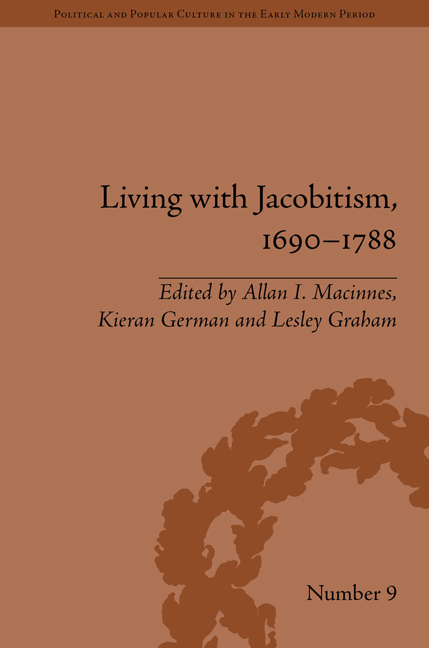Book contents
- Frontmatter
- CONTENTS
- List of Contributors
- List of Figures
- Abbreviations
- Preface: Breandán Ó Buachalla, A Tribute
- Introduction: Living with Jacobitism
- 1 The First Jacobite and the Scottish Parliament
- 2 The Scottish Jacobite Community at Saint-Germain after the Departure of the Stuart Court
- 3 Liturgy: The Sacramental Soul of Jacobitism
- 4 ‘Zealous in the Defence of the Protestant Religion and Liberty’: The Making of Whig Scotland, c. 1688–c. 1746
- 5 Jonathan Swift's Memoirs of a Jacobite
- 6 ‘Female Rebels’: The Female Figure in Anti-Jacobite Propaganda
- 7 Commerce and the Jacobite Court: Scottish Migrants in France,1688–1718
- 8 Ultramontane Ultras: The Intellectual Character of Irish Students at the University of Paris
- 9 To a Fair Meeting on the Green: The Order of Toboso and Jacobite Fraternalism, 1726–c. 1739
- 10 English and Scottish Jacobite Painters in Eighteenth-Century Rome
- 11 Polite War: Material Culture of the Jacobite Era, 1688–1760
- 12 Robert Adam: ‘My Mother's Dear British Boy’
- 13 From Jacobite to Jacobin: Robert Watson's Life in Opposition
- 14 Robert Louis Stevenson's ‘The Young Chevalier’: Unimagined Space
- Notes
- Index
8 - Ultramontane Ultras: The Intellectual Character of Irish Students at the University of Paris
- Frontmatter
- CONTENTS
- List of Contributors
- List of Figures
- Abbreviations
- Preface: Breandán Ó Buachalla, A Tribute
- Introduction: Living with Jacobitism
- 1 The First Jacobite and the Scottish Parliament
- 2 The Scottish Jacobite Community at Saint-Germain after the Departure of the Stuart Court
- 3 Liturgy: The Sacramental Soul of Jacobitism
- 4 ‘Zealous in the Defence of the Protestant Religion and Liberty’: The Making of Whig Scotland, c. 1688–c. 1746
- 5 Jonathan Swift's Memoirs of a Jacobite
- 6 ‘Female Rebels’: The Female Figure in Anti-Jacobite Propaganda
- 7 Commerce and the Jacobite Court: Scottish Migrants in France,1688–1718
- 8 Ultramontane Ultras: The Intellectual Character of Irish Students at the University of Paris
- 9 To a Fair Meeting on the Green: The Order of Toboso and Jacobite Fraternalism, 1726–c. 1739
- 10 English and Scottish Jacobite Painters in Eighteenth-Century Rome
- 11 Polite War: Material Culture of the Jacobite Era, 1688–1760
- 12 Robert Adam: ‘My Mother's Dear British Boy’
- 13 From Jacobite to Jacobin: Robert Watson's Life in Opposition
- 14 Robert Louis Stevenson's ‘The Young Chevalier’: Unimagined Space
- Notes
- Index
Summary
In The Fall and Rise of the Irish Nation (1992) Thomas Bartlett aptly described the defeat of James II in the War of the Two Kings (1688–91) as ‘a shipwreck’ for the Catholic community. While the social constituency remained, its leadership was significantly damaged, if not wholly decapitated; those that remained were traumatized by the overwhelming strategic defeat. This chapter explores the consequences of that defeat for the Catholic constituency by highlighting how those attending the University of Paris navigated the theological currents of the mid-eighteenth century in the light of the defeat at the Boyne and Aughrim; the continuing existence of the Jacobite claim to the British monarchy; and the penal restrictions that prevailed in Ireland. It contends that the blend of these circumstances explains their remarkable commitment to papal authority and the concomitant rejection of fashionable ideas concerning Gallicanism, Jansenism and Concilliarism. The essay concludes by suggesting this experience of penal exile provides a precondition for the Roman character of Irish Catholicism in the nineteenth century and foreshadows the articulation of papal infallibility in 1870.
Conditions at Home
In physical terms, the reverse at the Boyne in 1690 and the slaughter at Aughrim in 1691 saw the removal of many active soldiers to the Continent. The Articles of Limerick contained a specific article whereby the Dutch Williamite general, Baron de Ginkel, would transport the remaining Jacobite forces to France.
- Type
- Chapter
- Information
- Living with Jacobitism, 1690–1788The Three Kingdoms and Beyond, pp. 111 - 124Publisher: Pickering & ChattoFirst published in: 2014



